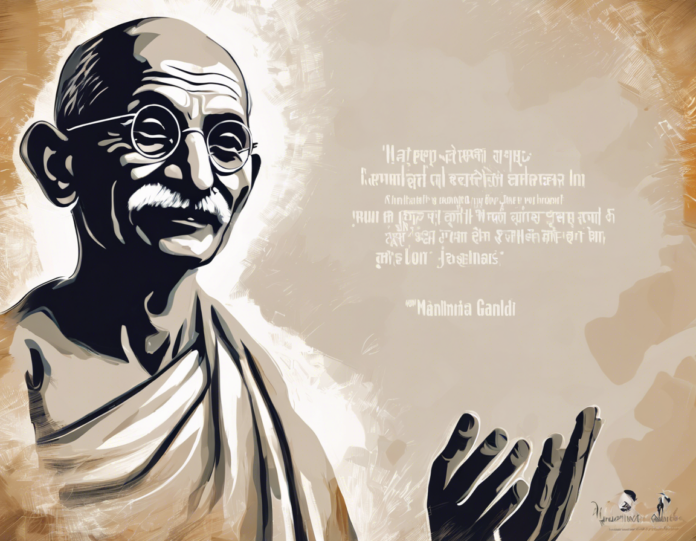Introduction:
Celebrated on 2nd October every year, Mahatma Gandhi Jayanti marks the birth anniversary of one of the most influential figures in India’s history, Mahatma Gandhi. He was a leader of the Indian independence movement against British rule and became an emblem of nonviolent civil disobedience. Gandhi’s teachings on peace, truth, and nonviolence continue to inspire people worldwide. On this occasion, it is important to reflect on his values and principles that can empower us to bring about positive change in our lives and society as a whole.
Gandhi’s Philosophy of Nonviolence:
At the core of Gandhi’s ideology was his belief in nonviolence or ahimsa. He advocated for resolving conflicts through peaceful means and passive resistance, rather than resorting to violence. Gandhi believed that true strength lies in the ability to confront injustice with love and compassion, rather than aggression. This philosophy not only fueled the Indian independence movement but also inspired several other civil rights movements across the globe, including the American civil rights movement led by Martin Luther King Jr.
Embracing Truth and Integrity:
Another key aspect of Gandhi’s teachings was the importance of truth and integrity. He encouraged people to always speak the truth, no matter how difficult it may seem. Gandhi believed that honesty and transparency were essential for building trust and fostering harmonious relationships. By embracing truth and integrity in our actions, we can create a more ethical and just society, free from corruption and deceit.
Selfless Service and Community Empowerment:
Gandhi was a strong advocate of selfless service to others and community empowerment. He believed in the concept of Sarvodaya, which translates to the upliftment of all. Gandhi encouraged individuals to work for the betterment of their communities and to serve others without expecting anything in return. Through acts of kindness, generosity, and compassion, we can create a more inclusive and compassionate society where everyone has the opportunity to thrive.
Sustainability and Simplicity:
Gandhi’s emphasis on sustainability and simplicity is especially relevant in today’s world, where environmental degradation and consumerism are major concerns. He promoted living a simple lifestyle that is in harmony with nature and does not exploit resources unnecessarily. By adopting sustainable practices and reducing our consumption, we can contribute to the well-being of the planet and ensure a better future for generations to come.
Overcoming Adversity and Resilience:
Throughout his life, Gandhi faced numerous challenges and setbacks, but he never wavered in his commitment to his principles. His resilience and perseverance in the face of adversity continue to serve as a source of inspiration for countless individuals facing obstacles in their own lives. Gandhi’s ability to stay true to his values and beliefs, even in the most difficult times, teaches us the importance of determination and courage in the pursuit of meaningful change.
Educating and Empowering the Youth:
Gandhi had a deep conviction in the power of education to bring about social change. He believed that the youth are the future leaders of society and should be equipped with the knowledge and values necessary to create a better world. By empowering the youth through education, mentorship, and opportunities for growth, we can ensure a more enlightened and progressive society.
Building a Culture of Peace and Tolerance:
One of Gandhi’s most enduring legacies is his call for peace and tolerance in the face of conflict and division. He believed that true freedom can only be achieved through mutual respect and understanding among individuals of different backgrounds and beliefs. By fostering a culture of peace and tolerance, we can bridge divides, promote interfaith harmony, and build a more inclusive society where everyone is valued and respected.
Conclusion:
On this Mahatma Gandhi Jayanti, let us reflect on the timeless wisdom and teachings of the great leader and strive to embody his values of nonviolence, truth, selfless service, sustainability, resilience, education, peace, and tolerance in our own lives. By embracing these principles, we can work towards creating a more just, compassionate, and harmonious world for all.
Frequently Asked Questions (FAQs):
1. What was Mahatma Gandhi’s role in India’s independence movement?
Mahatma Gandhi played a pivotal role in India’s independence movement by advocating for nonviolent civil disobedience and passive resistance against British colonial rule.
-
What are some key principles of Gandhi’s philosophy?
Some key principles of Gandhi’s philosophy include nonviolence, truth, selfless service, sustainability, simplicity, resilience, education, and peace. -
How did Gandhi inspire other civil rights movements worldwide?
Gandhi’s ideology of nonviolence inspired several other civil rights movements globally, including the American civil rights movement led by Martin Luther King Jr. -
Why is Gandhi’s philosophy of nonviolence still relevant today?
Gandhi’s philosophy of nonviolence is still relevant today as it offers a peaceful and ethical approach to resolving conflicts and promoting social change. -
What can individuals do to honor Gandhi’s legacy on Mahatma Gandhi Jayanti?
Individuals can honor Gandhi’s legacy by practicing nonviolence, speaking the truth, serving others, living sustainably, being resilient, promoting education, fostering peace, and embracing tolerance in their daily lives.

